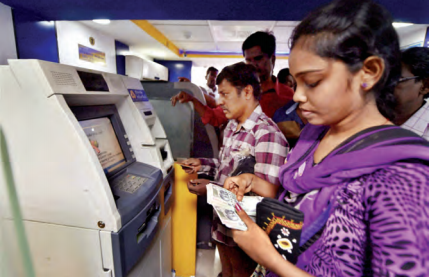Angel Gurría
Biz@India
June 2017
While there might be some causes for concern, the overall environment is looking towards a gradual growth, where concrete measures, albeit controversial, might just be the path for progress, says Gurría.
A Mexican economist by training and a former minister of foreign affairs as well as finance, Angel Gurría has completed 11 years as the secretary-general of OECD, a think tank of developed economies. Over the years, Gurría has expanded OECD through new member countries but also earned its due space on the world’s most important discussion tables. In a conversation with Biz@India, Gurría talks about the challenges and opportunities facing the world and Indian economy in the year ahead.
What is your biggest worry for 2017?
Uncertainty. It has to do with trade, because of Trans-Pacific Partnership (TPP), Transatlantic Trade and Investment Partnership (TTIP), North American Free Trade Agreement (NAFTA) and different bilateral free trade agreements between many countries. The second worry is about tax treatments. When it comes to trade today, if you look at Financial Times, you look at the guacamole wars, it gets very specific. The other thing is the whole question about international cooperation as we go into a period where – for climate change, for trade, for investment, for increasing the growth prospects – international cooperation, open borders, free trade, free investment flows seems to be more necessary than ever before. The bottom line is that we are all very happy that new administration is taking office today. Not only the new President of United States of America (US) will be in office but his ministers and secretaries will be in office. They will start talking with their counterparts. They will more clearly state what their ambitions and aims are. People would then understand and they will start a conversation, if there is room in order to move in that direction, which I think there is. It’s good that they are finally there and now we have discussions and conversations around partners rather than simply on social network messengers.
Don’t you think 2016 also marked a pushback/rollback of globalisation because of all the areas you marked out?
I hesitate to say that globalisation is slowing down. It is too easy to blame globalisation, because it doesn’t have a face or a neck to hang it from, no body. It’s just a notion that is inevitable, which is growing, which is unstoppable. It is represented by trade, investment, by the digital revolution, by fourth industrial revolution, by ideally greater openness, by trade and investment liberalisation, by a more robust financial system than we had in the last financial crisis. Today the likelihood of a crisis occurring from the financial sector is much less, it is better capitalised, and it is better supervised and regulated. So there has been a lot of progress since the crisis. But I would say now, a moment is there when uncertainties rise again and hopefully we can dispel them soon.
But aren’t people voting against inclusivity? Look at the rise of the far right in Germany, in France, Brexit.
It is true that perhaps we weren’t inclusive enough in the process of globalisation and increasing growth. So now we have to get back to the drawing board and get all those people back on the bandwagon that may have benefited less or not benefited or even affected by the process but that is a policy omission. There are some policy commissions, which they got wrong. Then there are some policy omissions, because they simply didn’t think about it or do it. Right now we just have to have a proper balance, between productivity and growth and the actual inclusiveness or inclusion.
Are there any bright spots for 2017?
Look at the positive side of the situation today. Lower rates of crude oil, lower taxes and higher investment can translate into high growth. If the tax processes lead to a reduction in number of taxes and tax rates, instead of just tweaking the rates between various segments, you can have a very interesting result. The other thing that we have been suggesting to the US government, is to rationalise their corporate tax rates to allow profits to be repatriated back to US, because now they are not being invested, because right now that is not happening.
The other thing is Europe. If we could continue to have gradual but steady improvement, that will be another positive. Our expectation for 2017 is gradual but steady improvement in the overall global economy, in different regions. We have factored in an increase in the growth in our estimates for the year.
Now some questions about the Indian economy. What do you think of the decision by the Indian government about the currency swap or demonetisation?
Demonetisation made some people uncomfortable in the short term because at times there were lack of bills and transactions were affected, but in the medium and the long term, demonetisation is a part of a whole process leading to financial deepening, financial education, and more financial instruments and less cash, which is a trend worldwide, and it has to do with the process of modernisation of the Indian economy of also fighting what I would call dark side. Again this is happening practically everywhere in the world.
But in a way isn’t it like building the house without first laying the foundation. The banking system ought to have been prepared adequately, people educated on how to use cashless transactions and to create the infrastructure necessary for a cashless world?
That means you would start in 50 years so no that is not the case. I mean you cannot have an ideal situation, you work with what you got. You have already created 270 million bank accounts, which did not exist a few years ago. That is massive penetration. Financial education has to be in the curriculum of every school, but at the same time it’s going to happen very fast.
Those 270 million people, who now have a bank account for the first time, are going to learn financial education in a way through a crash course. But I don’t agree that conditions have to be ideal before you start to reform. I think you have to start the reform the moment you have the political possibility of doing that, which means when the government is strong, when there is a strong leadership, when it has a vote and it can carry through.
What has to be done in terms of tax reforms and to clean up the Indian bank system?
When you come to tax reforms, it’s about having resources… resources to invest more in health, education, infrastructure, water and sanitation, roads and bridges, airports and ports, etc. A lot of needs, and you want to finance them soundly without deficit and death. Therefore you need resources.
Now about the banks, you have non-performing loans, which are now moving into around nine pc of the total loan book of the Indian banks. You have to address this. These banks have to be cleansed. The bad loans have to be identified, gotten off the balance sheet, then their efficiency measures have to be taken and eventually the banks have to be re-capitalised so that they can serve Indian economy better.
The banks are not only supposed to survive, but they are also supposed to lend. This is what they do. They take the savings of the people and lend it to the investors to make the economy grow faster.
Who will bear the burden of it?
Who is the owner of these banks? Well, if the owner of the bank is the private sector they will have to find a solution, based on the capital of the shareholders. There may be a little bit of help from the government. But if the government is the owner of the bank, then of course the government is going to have to take steps to resolve the issue.











